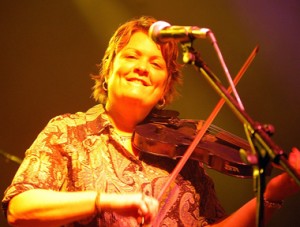The fire-breathing fiddler Eileen Ivers has deep Irish roots. Her parents are from Ireland. She learned fiddle from the great Martin Mulvihill. She won the All-Irelands nine times. (Yikes.)
But if you know Ivers at all, you know she’s profoundly influenced by other musical genres, from jazz to Afro-Caribbean roots music. She was the featured fiddler in the megahit Riverdance, which brought Irish music to the fore in the United States and throughout the world (and which many purists regard as not at all Irish).
If you’ve ever attended an Eileen Ivers show, you know that her performance (and that of her band Immigrant Soul) can be both exhilarating and exhausting. She pours absolutely everything into a show—blood, sweat, tears, shredded bow hair and all. I attended an Ivers outdoor summer concert a few years back and, at the end, she was just drenched. (I hugged her, anyway.)
We chatted once before, and her upcoming show (Saturday, September 25, at 8 p.m. in the Zellerbach Theatre on the Penn Campus) gave us an opportunity to touch base once again. So we just picked up where we left off the last time. Here’s what she had to say.
Q. How often do you get into traditional Irish music sessions these days?
A. Not nearly as much I would like. Were going to Ireland in October and I seem to play in more sessions there than I do at home. We have a little house in Mayo, and there are a couple of really good sessions that I try to get to. It totally rejuvenates me. Sometimes, at festivals, there are great sessions on when you get back to the hotel. They’re always good to sit in on, of course.
Q. Is playing in sessions something you do, mostly, when you’re home? Or something you fit in when you’re on the road?
A. Definitely more on the road. When you’re home. you’re in a “home” mode. When I’m out and about, that’s when I hang out in sessions.
Q. What do you get out of sessions that you don’t get from performance?
A. It’s really all part of being an Irish traditional musician. It’s a wonderful privilege to be traveling around and playing Irish music. The venues that are looking to book Irish artists are really spectacular. We’re blessed to be able to perform, to do the symphony work. But at the same time, it’s important to get off the stage and sit in where the music is really living and breathing, playing with friends and remembering tunes, playing tunes that you haven’t played in years. You have to get back to that. It brings back why you’re playing in the first place.
Q. I don’t play fiddle, but if I did, I’m not sure I’d be able to play with you sitting next to me. My guess, though, is that you’re not really all that scary … or that’s not how session etiquette would dictate that people respond to you.
A. I don’t feel like that at all, and I would hate to have anybody think that or feel that. What I love about this music and our culture is that you’re part of a much bigger thing. And when you’re sitting down with a bunch of folks, and you look around and see the smiles, it’s healing. You’re just a part of it, and it’s so cool.
Q. How much time do you spend in teaching and workshops these days?
A. Not as much as I would like. That’s such a great feeling to put the music out there, especially to kids. I actually love when the band is in stage with me for the master class. They talk about the history of the music and the rhythms, and each musician will show how his instrument works. All of sudden, they’re inspired by this stuff. They see the fun, the joy of it. They think it’s the coolest thing ever. We do it as much as we can. We always offer it and we love doing it.”

